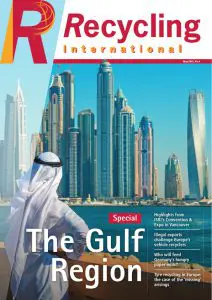Page 29 from: May 2015

trucks. The company focuses on: the collection
and processing of non-ferrous and ferrous
scrap from industrial, commercial and retail
sources; the collection of end-of-life vehicles
for dismantling and shredding in Saudi Arabia;
and the sale of various grades of prepared scrap
to domestic and also export customers around
the globe.
Although business has expanded greatly over
the past 50-plus years, what hasn’t changed is
that Sharif Metals is still 100% family-owned,
with Salam Al Sharif its chairman and brother
Monir its chief executive officer. Another broth-
er, Ahmad Al Sharif, is responsible for the Jor-
dan-based operations while Mohammed Al
Sharif manages the Kuwait location. In addi-
tion, a handful of fourth-generation family
members is already active within the company
and is being primed to take over at some point
in the future. Salam’s son Mahmoud is one of
them along with Nasser in Kuwait, Moham-
med’s son.
Smelting community
This morning, Mahmoud had taken me on a
quick tour around Sharif Metals’ aluminium
and lead recycling facilities outside Sharjah, a
half-hour drive from the company’s headquar-
ters. The facilities are close to one another, on
the edge of the Sa’jaa industrial zone. To the
north are warehouses and small industries, with
the Sharjah skyline in the distance; to the south,
there is just empty desert.
Inside and outside the factory, aluminium scrap
– including wheels – is waiting to be smelted
and further processed. Most of the employees
are Indians; the workers live in an apartment
building next to the facilities, and there are
Indian shops and an Indian restaurant.
Important base
Sa’jaa is an important base for Sharif Metals’
future growth as the company’s head office and
scrap yard slowly but surely become swallowed
up by Sharjah’s gathering urbanisation. In just
10 to 15 years, this emirate neighbour of Dubai
has grown into a city of 1 million souls – most of
whom are commuters working in Dubai itself.
Hungry property developers are increasingly
interested in the area occupied by Sharif Metals
and other industrial users and want to replace
factories with office and apartment skyscrapers.
‘Obviously, urbanisation will sooner or later
push a recycling business such as ours out of
the city,’ acknowledges Salam. ‘So at some point
in time, we might have to pack our bags and
rebuild on the outskirts, in Sa’jaa, near our lead
and aluminium facilities, in what is now still
open desert.’
And he adds philosophically: ‘If we have to relo-
cate, we will make the best of it.’
War-zone scrap
A different kind of challenge is presented by
import restrictions on scrap originating from
countries in the Middle East and North Africa
officially designated as war zones. For example,
scrap from Syria cannot be imported into the
UAE, Libya and Sudan are also on this list.
‘Obviously, this has an impact on the business
and has forced us and others to look for alter-
native sources,’ Salam notes. ‘However, since we
have always been a company that is proactive,
we are prepared to encounter every challenge
that comes along.’
Increased political and social unrest across the
Arabian peninsula is a growing concern for the
scrap business. ‘War and instability are bad for
the economy; they are bad for trade,’ says Salam.
‘You don’t want that.’
No limitations, no shortages
If there were no limitations on trade, there
would be no shortage of secondary raw mate-
rials worldwide, Salam believes. ‘It is only by
enforcing restrictions that block free trade that
you create shortages of materials,’ he argues.
Clearly, Salam is no supporter of the export ban
on ferrous scrap that still exists in Saudi Arabia.
But at the same time, Sharif Metals is running
a profitable business there. ‘The two shredders
we operate in Saudi Arabia work at full speed
to provide local steel producers with the nec-
essary infeed of materials,’ he points out.
www.sharifmetals.com
Monir Al Sharif:
‘We know how to handle
beverage cans.’
Salam Al Sharif with his son Mahmoud (left) and his brother Monir.
Middle East recyclers
saved from
logistical nightmare
Subsequently suspended after huge protests from
the global recycling industry, the new foreign
trade policy announced by India at the beginning
of April would have had ‘a dramatic impact on
metal scrap exporters and traders in the Middle
East’, confirms Salam Al Sharif in his role as
president of the Bureau of Middle East Recycling.
In particular, Sharif strongly condemns the pro-
posed tightening of inspection procedures such
that there would have been a requirement for
all metal scrap imports to be inspected by
approved surveyors and for the entire process of
loading into containers to be put on video, show-
ing the inspector’s face, the exporter’s face, all
carriage details and inspection equipment.
‘For us, this would be very dramatic,’ replies
Salam when asked how such changes would
affect his own business and day-to-day opera-
tions. Sharif Metals is heavily dependent on
exports to customers in India: on a monthly
basis, the company ships out some 300 contain-
er-loads of copper-based materials, of which ‘30
to 40%’ goes to India.
‘I expect major delays in procedures for con-
tainer loadings and shipments,’ Salam says. ‘It
will cost the exporter money for sure. Moreover,
it will lead to bad performance of contracts on
the supplier side. Your customers simply won’t
accept that. And you don’t deliver the contain-
ers for export on time; this will result in major
logistics problems.’
The proposed procedures would have required
considerable additional paperwork, according to
Salam, while another ‘impossible’ requirement
would be for only a certain number of people at
certain points to be authorised to inspect mate-
rial fl ows for India. ‘The problem is that you don’t
know when these inspection offi cers are available;
there is absolutely no fl exibility,’ Salam complains.
29May 2015
RI 4-ME_Sharif Metals.indd 29 04-05-15 09:15



